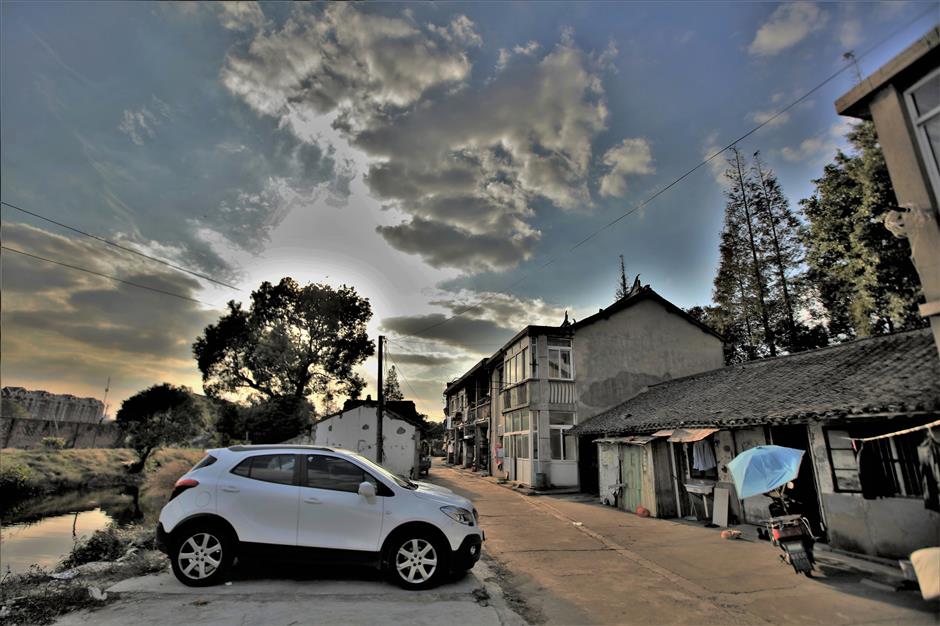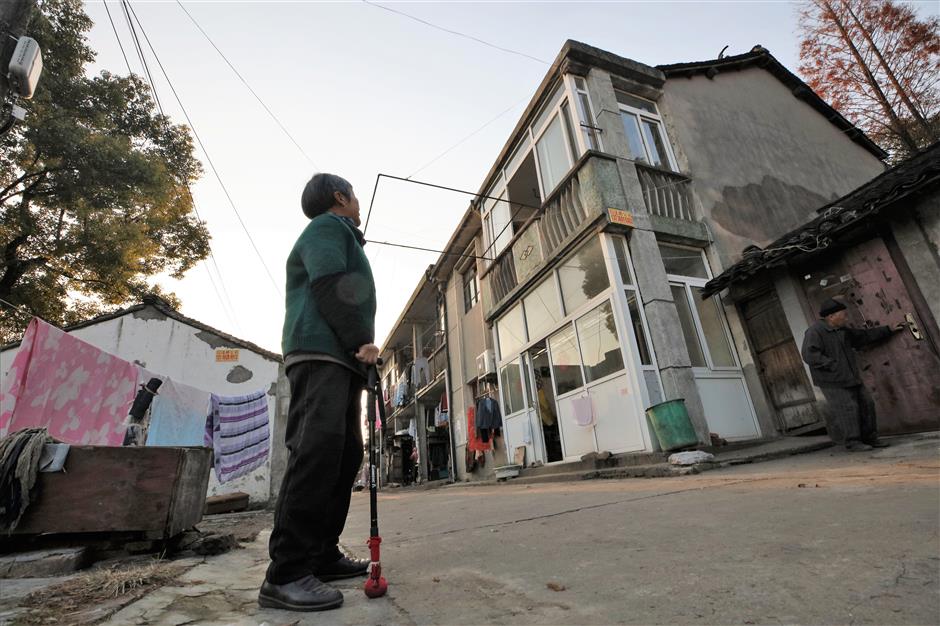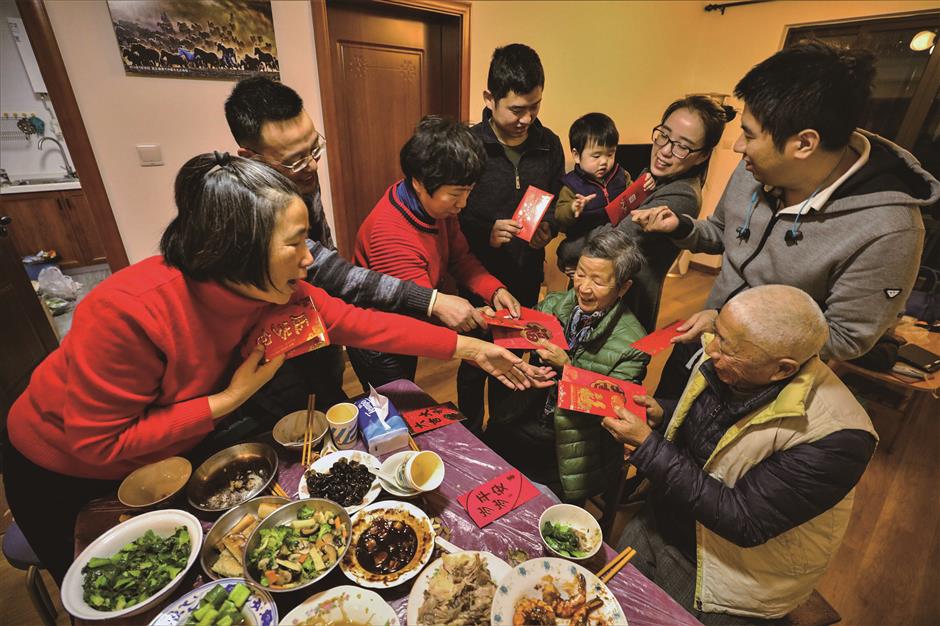Warm memories linger as family bids farm farewell
Moving from an old family home can be a wrenching experience. When urban sprawl finally caught up with the rural childhood home of journalist Li Huihua, her parents’ house was earmarked for demolition and the couple was relocated to a more urban area. Li, a reporter for City News, wrote a brief memoir of her life in the small farm village and the anguish of her parents leaving. Her narrative was published in the Minhang News.

The old family home.
My family moved from the old home in Li’s Village in Zhuanqiao Town before Spring Festival this year. My parents, who are in their 80s, had lived in the house all their lives. There were plenty of arguments about what to take and what to leave behind. It seemed that even the smallest belonging could evoke so many memories.
Since 1994, my father had the habit of saving newspaper cuttings that he liked and keeping them in notebooks. Relatives, neighbors and friends often marveled at his collection. To leave it ball behind would be like cutting off a piece of his flesh.
But the cuttings had to go. There simply wasn’t room for them in the smaller new home allocated to my parents. My father mournfully leafed through all the notebooks, mumbling what a shame it was to have to throw them out.
House moving for younger people is mostly just an inconvenience, but for elderly people who have spent their entire lives in a village, the whole exercise is heart-wrenching.
There were only seven families living in the tiny Li’s Village, which is just 150 meters long from east to west. Many young residents left long ago to seek their fortunes in the city, leaving old people and their old houses behind.
The family living next door was a distant relative of my father’s. In fact, nine generations of our families have been neighbors. When the two families were relocated, they were assigned new homes in different areas. Would they ever see one another again? In parting, both families decided to leave on the same day.
“We’re going to leave one step ahead,” my father said to the neighbors, before taking one final photo of everyone in front of the house.

Li's mother gazes fondly at the old house, no matter how ramshackle.
Our childhood was one of poverty. My parents eked out an existence on a monthly salary of 73 yuan (about US$12). My sisters, since the age of seven, learned knitting to help out with family expenses. My mother cooked vegetable soup for every meal. I was diagnosed with severe malnutrition at 14.
My elder sister learned how to cook when she was very young. She used to run home from school during class breaks to start the fire and boil water. She also found time to wash clothes.
Mother had a job as a lathe worker, and she had no energy at the end of a long day’s shift to tend to farm work. When we were young, she woke us before dawn to go out in the fields and transplant rice seedlings. When the midday sun came up and we still weren’t finished, neighbors and cousins would come along and lend a hand. They brought food for us with them. We were very grateful.
My parents had three daughters. The absence of a son was a bit of a social stigma. Women in the village were generally regarded as inferior to men, who had to bear the brunt of hard farm labor.
But my parents never mistreated us. Even when we were little girls, my mother and grandmother started to save for our dowries.
In the 1970s, a bride was expected to bring quilts, new clothes and a sewing machine to the marriage. My mother labored to save the money to silk bed sheets to avoid our family looking inferior.
Despite a hard life, my sisters and I never stopped our studies.
“It’s too hard to be a farmer,” my mother used to tell us. “You girls can’t take it. You have to study to change your futures.”
The three of us were always among the top students at school. When we were finally admitted to universities, my parents beamed with pride.
I chose teachers’ training because it didn’t require study fees, and the university gave me a monthly stipend of 16 yuan. My mother was a bit sorry to be losing her daughters’ help at home but she put on a brave face. I felt a bit guilty about leaving, but I went on to graduate from university.
When my younger sister won entry to a university in Zhejiang Province, my parents dismantled a pig shed to raise the 200 yuan for her study fees.

Making sticky rice cakes over a wood-fire stove.
My father worked for a time in the city and came home only once a week. We loved cooking for his homecoming. Preparation for the Chinese New Year was also an especially joyous time. We used to get up early to buy food and make sticky rice cakes.
Actually, sticky rice cakes were a specialty of my mother. Villagers used to ask her to make cakes for them, even though she barely had the time. As a gesture of gratitude, neighbors always brought some special food for her. We looked forward to tasting it.
On the day of making sticky rice cakes, the three of us gathered around to help my mother in the kitchen. She built up layers of flour, sugar and nuts until the cake was about 10 centimeters thick. We always looked forward to that first taste when the cakes were done.
I always liked setting the fire, especially in winter. After the house was connected to gas, my parents still used the old wood stove, even on the hottest summer days, because they were so thrifty.

The extended family celebrates its first New Year's Eve in the parents' new home. It begins a new chapter in their lives after moving from the old family home.
In 1988, our farm field was requisitioned by the government. What a relief it was to stop doing farm work. My parents seemed to smile more. I was married by that time, and my husband and I lived in the city 90 kilometers away. After my parents were relocated, we are all living closer.
My father was always tied in spirit to the land. He planted broad bean seeds last year, even though I told him they would be moving and wouldn’t be there for the harvest. He prayed that the demolition of our old house might be delayed to allow him one last harvest. But it wasn’t to be. I understood his affinity with the land because I, too, love the sights, smells and sounds of rural life.
I know my parents would rather have stayed in their old house than move to better accommodation in the city.
How to say good-bye to a house full of memories? In the end, I turned back one last time to see the house of my childhood and said, “Farewell, old friend. I will always remember you.”
(Translated by Cao Yunyi)
















